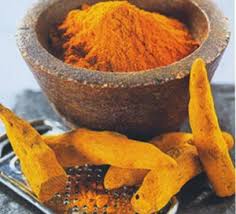We are a health-conscious generation and in theory, know the nutritional value of almost every food. But our taste buds are not slaves of the information we've gathered. In fact it's clearly the other way round! Some fruits are just non-seasonal the year round, while some veggies can never make it to the menu. If we don't like the taste of one, the smell of the other makes us say "eew" (the calcium-rich milk has my vote!). Well, we all may just get to keep our lists of outcasts without having to ever hear the doctor announce the deficiency we invited ourselves. Just grasp the tricks
of food fortification.

A pinch of this and a pinch of that!
Fortification is not new to Indian cuisine. Our spices are a storehouse of vitamins and other nutrients, informs nutritionist Naini Setalvad. Think of an ailment, and our good old turmeric's ready to fight. She reminds us of its anti-septic, anti-histamine and even cancer fighting properties. And indeed, the yellow power is rich in tonnes of nutrients - dietary fiber, vitamin C, vitamin B6, niacin, manganese, iron, potassium, magnesium, omega 3 fatty acids, omega 6 fatty acids and phytosterols.

Sow the seeds for a healthy heart
Cardiologist Dr Dhanashri Chonkar prescribes sunflower seeds, flaxseeds, pumpkin seeds, and sesame seeds to ensure that bad cholesterol doesn't come knocking. These seeds contain good monounsaturated fats that help keep cholesterol levels low and also lower blood pressure. While in the Western countries these seeds often land on buns and bakes, she suggests that we can incorporate them in our chutneys. "In fact, the traditional Maharashtrian diet serves interesting chutneys made from these seeds with bakhri."

Substitute nutrition
While for the non-vegetarians, fish serves as a great source of the very important omega 3 essential fatty acids not produced by our body, those not into seafood can include in their meals flaxseeds, says Setalvad. "And to ensure that your family's diet in rich in calcium, mix oats and barley to the flour," she suggests. For sulphur, onions are very good, woch the Indian cooking uses almost be default. For a dose of zinc, she counts the other seeds already suggested by Dr Chonkar
.
Fortifying desserts
Nutritionist Namita Jain says honey makes for the perfect topping sauce thanks to glucose, B complex, C vitamins and some antioxidants. What's more, honey is always welcome to our taste buds, and works well practically with all the desserts says, Chef Arindam Bahel. More concerned with the taste aspect, he suggests marrying honey with cream, nuts and even chocolates.

For the kids
It's the kids who are the most fussy, agree all mothers worried about ensuring that their little ones receive a balanced diet. Paediatrician Dr Deepa Bhandarkar shares some sneaking tips for them, "Mix jaggery in dal. It's a rich source of iron." She also says that if kids don't like vegetables, prepare a blending and knead the dough in that liquid. "Like this you can sneak in their requirements of vitamin A and B, she says. And according to her, allow them to indulge in bhel. If made with chana, peanuts and sprouts, it's not really junk food."
of food fortification.
A pinch of this and a pinch of that!
Fortification is not new to Indian cuisine. Our spices are a storehouse of vitamins and other nutrients, informs nutritionist Naini Setalvad. Think of an ailment, and our good old turmeric's ready to fight. She reminds us of its anti-septic, anti-histamine and even cancer fighting properties. And indeed, the yellow power is rich in tonnes of nutrients - dietary fiber, vitamin C, vitamin B6, niacin, manganese, iron, potassium, magnesium, omega 3 fatty acids, omega 6 fatty acids and phytosterols.
Sow the seeds for a healthy heart
Cardiologist Dr Dhanashri Chonkar prescribes sunflower seeds, flaxseeds, pumpkin seeds, and sesame seeds to ensure that bad cholesterol doesn't come knocking. These seeds contain good monounsaturated fats that help keep cholesterol levels low and also lower blood pressure. While in the Western countries these seeds often land on buns and bakes, she suggests that we can incorporate them in our chutneys. "In fact, the traditional Maharashtrian diet serves interesting chutneys made from these seeds with bakhri."
Substitute nutrition
While for the non-vegetarians, fish serves as a great source of the very important omega 3 essential fatty acids not produced by our body, those not into seafood can include in their meals flaxseeds, says Setalvad. "And to ensure that your family's diet in rich in calcium, mix oats and barley to the flour," she suggests. For sulphur, onions are very good, woch the Indian cooking uses almost be default. For a dose of zinc, she counts the other seeds already suggested by Dr Chonkar
.
Fortifying desserts
Nutritionist Namita Jain says honey makes for the perfect topping sauce thanks to glucose, B complex, C vitamins and some antioxidants. What's more, honey is always welcome to our taste buds, and works well practically with all the desserts says, Chef Arindam Bahel. More concerned with the taste aspect, he suggests marrying honey with cream, nuts and even chocolates.
For the kids
It's the kids who are the most fussy, agree all mothers worried about ensuring that their little ones receive a balanced diet. Paediatrician Dr Deepa Bhandarkar shares some sneaking tips for them, "Mix jaggery in dal. It's a rich source of iron." She also says that if kids don't like vegetables, prepare a blending and knead the dough in that liquid. "Like this you can sneak in their requirements of vitamin A and B, she says. And according to her, allow them to indulge in bhel. If made with chana, peanuts and sprouts, it's not really junk food."